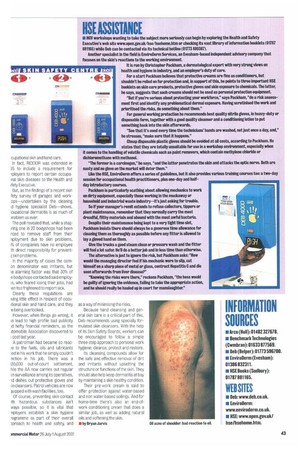NE ASSISTANCE
Page 43

If you've noticed an error in this article please click here to report it so we can fix it.
• HGV workshops wanting to take the subject more seriously can begin by exploring the Health and Safety Executive's web site wvnv.open.gov.uk/hse/tisehome.htm or checking its vast library of information booklets (01787 881165) while Deb can be contacted via its technical hotline (01773 880367).
Another specialist in the field is EnviroDerm Services, an Evesham-based independent advisory company that focuses on the skin's reactions to the working environment, It is run by Christopher Peckham, a dermatological expert with very strong views on health and hygiene in industry, and an employer's duty of care.
For a start Peckham believes that protective creams are fine as conditioners, but shouldn't be relied on for protection and, in support of this, he points to three important HSE booklets on skin care products, protective gloves and skin exposure to chemicals. The latter, he says, suggests that such creams should not be used as personal protection equipment. "But if you're serious about protecting your workforce," says Peckham, "do a risk assessment first and identify any problematical dermal exposure. Having scrutinised the work and prioritised the risks, do something about them."
For general working protection he recommends best quality nitrile gloves, in heavy-duty or disposable form, together with a good quality cleanser and a conditioning lotion to put something back into the skin afterwards.
"See that it's used every time the technicians' hands are washed, not just once a day, and," he stresses, "make sure that it happens."
Cheap disposable plastic gloves should be avoided at all costs, according to Peckham. He states that they are totally unsuitable for use in a workshop environment, especially when it comes to the handling of volatile chemicals such as paint removers, which contain methylene chloride or dic loromethane with methanol.
'The former is a carcinogen," he says, "and the latter penetrates the skin and attacks the optic nerve. Both are nasty and no glove CM the market will deter them" like the HSE, EnviroDerm offers a series of guidelines, but it also provides various training courses too: a two-day session for occupational heath practitioners, plus one-day and halfday introductory courses,
'ackham is particularly scathing about allowing mechanics to work on dirty equipment, especially those working in the muckaway or household and industrial waste industry--it's just asking for trouble.
So If your manager's remit extends to refuse collectors, tippers or plant maintenance, remember that they normally carry the most dreadful, filthy materials and abound with the most awful bacteria.
Despite their maintenance being kept to a very tight time slot, Peckham insists there should always be a generous time allowance for cleaning them as thoroughly as possible before any fitter is allowed to lay a gloved hand on them.
;live the trucks a good steam clean or pressure wash and the fitter will feel a lot safer, He'll do a better job and in less time than otherwise.
The alternative is just to ignore the risk, but Peckham asks: "How would the managing director feel if his mechanic were to slip, cut himself on a sharp piece of metal or glass, contract Hepatitis C and die soon afterwards from liver disease?"
"Knowing the risks were there," reckons Peckham, "the boss would be guilty of ignoring the evidence, failing to take the appropriate action, and he should really be hauled up in court for manslaughter."




















































































































